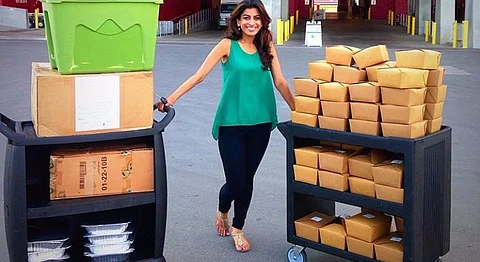
- HOMEGROWN WORLD
- #HGCREATORS
- #HGEXPLORE
- #HGVOICES
- #HGSHOP
- CAREERS
- ABOUT US
- CONTACT US

Komal Ahmad is trying to solve the food wastage problem of America, one meal at a time. CEO of Copia, earlier known as Feeding Forward, she is helping California’s 6,00,000 needy populace get a decent meal. She has achieved this feat by connecting homeless shelters to their nearby suppliers of leftover food be it event planners, companies, restaurants and even hospitals through her website and mobile app.
A Pakistani immigrant studying in University of California Berkeley, Ahmad was 21 when the food wastage problem walked into her. A 26-year-old US soldier who had served in Iraq approached her for food and the lunch she had with him changed her life. “He’d already gone on two deployments and now he’s come back, he’s 26 and on the side of the road begging for food,” Ahmad said in an interview with CNET.
It bothered her so much that she decided to do something about it. Within a few months, Ahmad set up a program at UC Berkeley called Bare Abundance that allowed the school’s dining halls to donate excess food to local homeless shelters. With that program, she then joined forces with a nationwide group called Food Recovery Network, which currently has food recovery projects on more than 140 college campuses across the US,’ wrote CNET.
In an interview with The Daily News, she called the food wastage in America the world’s dumbest problem. “One in six Americans don’t know where their next meal is coming from and the problem is worse in San Francisco. It’s not a lack of food. It’s an inequitable distribution of food,” she said. She equated the amount of food wasted every day in America to a football ground filled to the brim. She said that one in six people and one in four children in the United States doesn’t know where their next meal will come from.
Five years later, Ahmad is revamping Copia which will be complete soon. In her interview with Daily News she used her executive skills to explain the food problem in the country. ‘Food is the nation’s second largest source of waste, according to the US Environmental Protection Agency. Leftovers make up over 30 million tons of garbage at dumps. Feeding Forward, which only serves the San Francisco Bay area for now, has redistributed about 690,000 pounds of food,’ the report said.
Ahmad was particularly taken aback when she wanted to distribute 500 sandwiches to shelter but was unsuccessful. “A few months after starting the food recovery program in Berkeley, Ahmad got a call from a dining hall manager ready to donate 500 leftover sandwiches.
She leaped into action, renting a Zip Car and calling dozens of homeless shelters and organizations to see who wanted the food. About a third of the shelters didn’t answer the phone, another third didn’t need the food, and the remaining group told her they’d take just 10 to 15 sandwiches. “It was me on the side of the road, so frustrated and so upset,” Ahmad said. “There’s no lack of people who are in need of food. This is not a hunger issue. This is a distribution issue,” she told CNET.
Technology has helped Ahmad feed more people in need. By partnering with Bite Silicon valley, she has been able to streamline the process. “After one food conference featuring celebrity chefs, Feeding Forward received over 5,000 pounds of food donations, which fed over 4,200 people in eight different shelters and food banks and diverted more than 25,000 pounds of carbon dioxide emissions from landfills,” reported India Today. Her biggest challenge remains with the bottleneck of finding the shelters that would be ready to store large quantities of leftover food at a short notice.
‘Ever since her story was featured on CNET website, Komal Ahmad said that numerous people have contacted her to expand her initiative to other countries. As per Ahmad, she has been contacted by people from Nairobi, Hong Kong and even Bengaluru,’ Times of India reported.
While local food Samaritans like Mumbai’s Dabbawalas, the Robin Hood Army, the ‘No Food Waste’ mobile app try to solve the hunger problem in India, Ahmad is doing her bit in 6 cities of northern California. As she said in her interview to the Daily News, “Hunger is bad — it’s terrible everywhere — but in America, in the most prosperous, industrialized country in the world, this just shouldn’t exist.”
Feature Image Courtesy: Feeding Forward/ Independent
